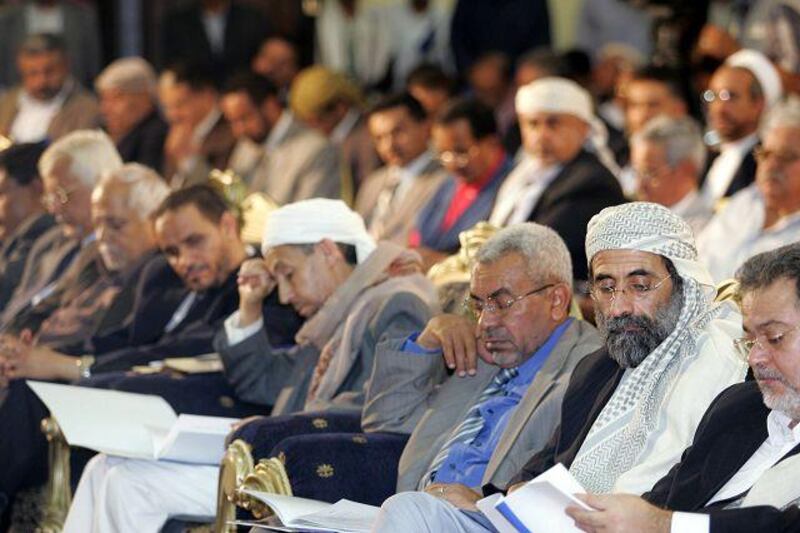SANA'A // After several rounds of meetings, opposition groups in Yemen made public a draft of its "National Salvation Vision". The document calls for a national dialogue process to bring an end to conflicts in the country, most crucially the al Houthi insurgency in the north and a separatist movement in the south. The document, which was released late on Monday night, was produced by the National Dialogue Committee, which is composed of 90 opposition figures from various groups, including politicians, civil society activists, clerics, tribal chiefs, businessmen, academics and others. The committee is led by the Joint Meeting Parties (JMP), an opposition coalition of six parties that includes Islah, Yemen's main Islamist party, and the Socialist Party. "This vision is meant to salvage the country and pull it [out of] the present sophisticated and grinding crisis that is likely to crack its unity and to eliminate what remains of the civil peace and social security," said Mohammed Salem Basoundowah, the head of the committee. The government of Ali Abdullah Saleh, the president, has its hands full dealing with the insurgency in the north and the secessionist uprising in the south in addition to a resurgent al Qa'eda and the severe economic hardships plaguing much of the populace. "Crises are growing bigger due to the pervasive political, economic and administrative corruption fuelled by continued autocracy and the absence of a state of institutions, and good governance," said Sheikh Hamid al Ahmar, the committee's secretary general and an influential tribal chief and business tycoon. The opposition has previously tried to enact constitutional reforms through the electoral process, but since Yemen unified in 1990, they have been unable to dislodge the ruling party, the General People's Congress (GPC). Since unification, Yemen has only been able to hold three successful parliamentary elections: in 1993, 1997 and 2003, all of which the GPC won. However, the ruling party and opposition JMP agreed in February to postpone this year's scheduled parliamentary election by two years to carry out electoral and constitutional reforms. However, the two sides' dialogue on the issues to be addressed before the 2011 election has reached a deadlock. The JMP hopes that a national dialogue that demonstrates its broad popular support may break the impasse and force government concessions. The opposition stipulated that for a fruitful dialogue to succeed, the conflict in the north and unrest in the south must be settled first. "After we failed in our political dialogue to reach an agreement through constitutional institutions, we have no option as opposition and other national forces but to call for a national dialogue. All relevant parties in the current crisis have to choose the way of dialogue. The other option will be what is happening now in Sa'ada," said Mohammed al Sabri, a spokesman for the committee. Mr al Sabri said the national dialogue, which has no set timeline, should involve al Houthis, the southern movement leaders inside Yemen and in exile and the ruling GPC. Mr Basoundowah, who is also an adviser to the president, said they would run meetings with broad segments of the community to discuss the document before holding the national dialogue conference at an unspecified date. He called on all groups - ethnic, regional, political - to support the dialogue process. Mr al Sabri dismissed concerns that the national dialogue is meant to foment a movement against the regime. "The document is a great political and national achievement and has come at the right moment for it opens other options before all Yemenis other than fighting each other. This is not a plot to overthrow the regime as some have alleged. Our option to avoid the collapse of the country will be peaceful; we will run protests and demonstrations to salvage our country," Mr al Sabri said. The document asks for the reform of the political system, preferring a parliamentary system with a less powerful president. It also suggested changing from a single winner electoral system to one of proportional representation. However, it emphasised that the imminent collapse of the state could only be avoided through immediate politcal action on the north and south turmoil. The ruling party lashed out at the vision document, describing it as unrealistic. "Those people who are talking about salvation have no realistic vision and there is nothing to be discussed with them. We need to salvage the country from them," Sultan al Barakani, the GPC assistant secretary general, was quoted as saying on the party website on Monday. "Their main business is to release accusations and to look for roles [to play]; they are themselves in a stalemate and should first look for solutions to their own problems before talking about the nation," Mr al Barakani said. With the fighting between the government and the al Houthi rebels in Sa'ada, there is growing concern in the West, and the region, that instability in Yemen might affect the entire Middle East and beyond. There is also concern that the government's preoccupation with the war in the north and separatist unrest in the south is allowing al Qa'eda to operate freely, turning Yemen into a sanctuary for its militants. malqadhi@thenational.ae
Yemenis hope their 'vision' will solve crisis
Opposition groups release document outlining need for national dialogue process to end the civil conflicts that are tearing the country apart.

More from the national




